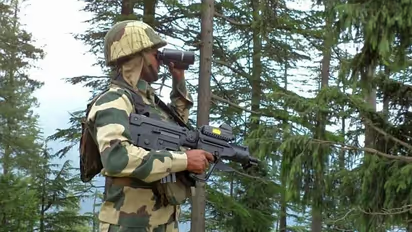Explained: The controversy over BSF's extended jurisdiction

Synopsis
The Union Home Ministry's decision to increase the area of responsibility for the Border Security Force from 15 km to 50 km in the states of Punjab, Rajasthan and West Bengal bordering with Pakistan and Bangladesh, has snowballed into a major controversy.
The Union Home Ministry's decision to increase the area of responsibility for the Border Security Force from 15 km to 50 km in the states of Punjab, Rajasthan and West Bengal bordering with Pakistan and Bangladesh, has snowballed into a major controversy.
The Opposition has termed the decision as against the concept of federalism and questioned the government's intent.
However, the fine print of the government order also mentions that the jurisdiction in Gujarat has been reduced to 50 km from 80 km while the status quo is maintained in the state of Manipur, Mizoram, Tripura, Nagaland and Meghalaya and Union Territories of Jammu & Kashmir and Ladakh.
Let's understand this more closely.
Why was the BSF jurisdiction extended?
States like West Bengal, Punjab and Rajasthan have witnessed trans-border crimes. The Gazette, which has been notified on October 11, will empower the border guarding force to search, arrest and seizure when it comes to the cases of drugs, arms and infiltration.
In recent times, Punjab has witnessed incidents involving drones dropping weapons and drugs. Sources say that this was the main reason why the Union Home Ministry brought this notification.
What is the stand of the state governments?
The Centre decision to extend the jurisdiction of the BSF received backlash from the Punjab government, which has termed the move as "irrational".
Punjab Chief Minister Charanjit Singh Channi took to social to strongly condemn the Centre's decision. He termed the decision as unilateral and as a direct attack on federalism.
To recall, on October 5, Chief Minister Channi had held discussions with Union Home Minister Amit Shah and urged him to seal the international border in his state to curb trafficking of drugs and weapons into Punjab from neighbouring Pakistan.
Channi predecessor Captain Amarinder Singh has expressed different views on the matter and asked the state to refrain from dragging the Border Security Force into politics.
Capt Amarinder said that there was no need to drag the BSF into politics considering that Indian soldiers were being killed in Kashmir and there had been a significant increase in the number of weapons and narcotics being pushed into Punjab by Pakistan-backed terrorists.
He endorsed the view that an enhanced BSF presence and powers will only make our defences stronger.
Assam Chief Minister Himanta Biswa Sarma too welcomed the decision, stating that it will serve as a strong deterrent for cross-border smuggling and illegal infiltration.
Sarma further said that the decision will strengthen national security and national interest.
The West Bengal government too is peeved with the Centre. The ruling Trinamool Congress has claimed that the decision was taken without consulting the state government.
Calling it an infringement on the rights of the state, the TMC sought to know why the Centre suddenly decided to enhance the BSF's jurisdiction without informing or consulting the state government.
Incidentally, the states where the limits have been increased are all being ruled by non-BJP governments while the jurisdictions where the BSF's area of responsibility has been reduced are being governed by the BJP.
What is the BSF's take on the matter?
According to BSF IG (Ops) Solomon Minz, the intent behind extending the BSF's jurisdiction is to curb trans-border crimes.
He further said jurisdiction had only increased under the Criminal Procedure Act, Passport (Entry into India) Act and Passport Act whereas the jurisdiction for NDPS Act, Arms Act, Custom Acts will be the same as before.
In a statement, the BSF said further said that the amendment establishes uniformity in defining the area within which the force can operate as per its charter of duties and execution of its role and task of border guarding in its areas of deployment.
Besides, the BSF also believes, that the new directive will facilitate operational effectiveness in curbing trans-border crime.
What do the experts have to say about this?
According to former Punjab Special Chief Secretary KBS Sidhu, "Needless to say, these powers have to be exercised in total coordination with the local police. One cannot have two police agencies operating simultaneously within such a large border belt."
Sidhu, however, clarified that the FIR would still have to be registered by the local police, which means they will investigate and put up the charge sheet before the court.
The prosecution agency must also be that of the state government unless they prefer to set up their own one like the CBI, he added.
Talking to Asianet News, former BSF ADG SK Sood said, "BSF does not have the resources and training to undertake these tasks in the interior. Earlier the same powers were there but they varied according to the population density of different areas. Even those powers could not be exercised due to the constraints mentioned above. Hence, the increased area for powers to search has no practical utility."
Another aspect is that most areas being not covered by AFSPA, the BSF will have to still involve state police if these operations are to be conducted, he said.
"Moreover, the BSF resources are focussed outward. We will need extra resources for collection of intel if we have to carry out these operations," Sood added.
Also Read:
Strategic Sela Tunnel crosses major landmark (WATCH VIDEO)
MiG 29K fighters simulate airstrikes in the Arabian Sea (WATCH VIDEO)
Stay updated with the Breaking News Today and Latest News from across India and around the world. Get real-time updates, in-depth analysis, and comprehensive coverage of India News, World News, Indian Defence News, Kerala News, and Karnataka News. From politics to current affairs, follow every major story as it unfolds. Download the Asianet News Official App to stay informed anytime, anywhere.